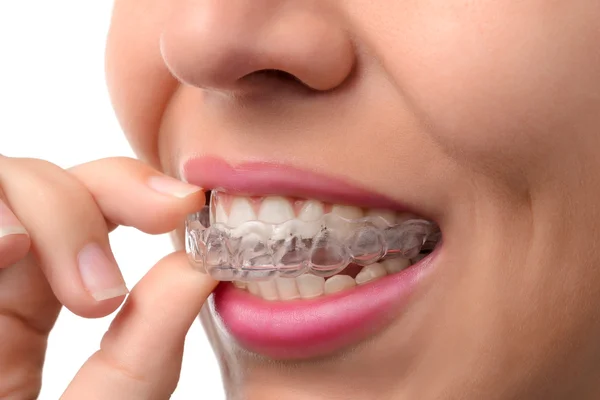Having straight teeth is not only aesthetically pleasing but also beneficial for your oral health. However, traditional metal braces are not for everyone, especially for adults who do not want to have a mouth full of metal for several years. Fortunately, Invisalign treatment offers a discreet and effective alternative for straightening teeth. In this blog post, we will explain what Invisalign is and how it works.
What is Invisalign Treatment?
Invisalign treatment is a teeth straightening method that uses clear, plastic aligners to shift teeth gradually into the desired position. The aligners are custom-made to fit snugly over your teeth and are virtually invisible, making them a popular choice among adults who want a discreet orthodontic treatment.
The Invisalign treatment involves a series of aligners that you wear for about two weeks each. Each aligner moves your teeth a little bit closer to the desired position. The number of aligners you need depends on the severity of your case, but most people need between 18 to 30 aligners for a complete treatment.
How Does Invisalign Work?
The Invisalign treatment uses a combination of 3D computer imaging technology and orthodontic expertise to design and manufacture a series of custom-made aligners for each patient. Here is how the Invisalign treatment works:
If you need a dentist in Barrow, look no further than Barrow Invisalign Services.
Step 1: Consultation and Examination
The first step in the Invisalign treatment is a consultation with an Invisalign provider, such as an orthodontist or dentist, who will examine your teeth and assess whether you are a good candidate for the treatment. They will also discuss your treatment goals and expectations.
Step 2: Digital Scanning and 3D Imaging
If you are a good candidate for Invisalign, your provider will take digital scans of your teeth using a handheld scanner or intraoral camera. The scans will create a 3D image of your teeth and mouth, which will be used to design your custom-made aligners.
Step 3: Treatment Plan Design
Using the 3D image of your teeth and mouth, your Invisalign provider will create a treatment plan that shows how your teeth will move throughout the treatment. This will also allow you to see the final result before starting the treatment.
Step 4: Aligner Fabrication
Once the treatment plan is approved, a series of custom-made aligners will be fabricated for you using a specialized machine. Each aligner will be slightly different from the previous one, as they are designed to move your teeth gradually into the desired position.
Step 5: Wearing the Aligners
You will wear each aligner for about two weeks before switching to the next one in the series. You should wear the aligners for at least 22 hours a day, only removing them for eating, brushing, and flossing.
Step 6: Monitoring Progress
Throughout the treatment, your Invisalign provider will monitor your progress and make any necessary adjustments. You will also have regular appointments, usually every six to eight weeks, to check that your teeth are moving as planned.
Step 7: Treatment Completion
Once you have completed wearing all the aligners in the series, you will have achieved your desired results. However, it is essential to wear a retainer to maintain the new position of your teeth. Your provider will discuss the retainer options with you.
Advantages of Invisalign Treatment
Invisalign treatment offers several advantages over traditional metal braces. Here are some of the benefits of Invisalign:
Discreet: Invisalign aligners are virtually invisible, making them a popular choice among adults who do not want a mouth full of metal.
Comfortable: Invisalign aligners are made of smooth, BPA-free plastic that is comfortable to wear and does not irritate the inside of your mouth like metal braces can.
Removable: Invisalign aligners are removable, so you can take them out when eating, brushing, and flossing, allowing you to maintain good oral hygiene throughout the treatment.
No food restrictions: Since you can remove the aligners while eating, there are no restrictions on the types of food you can eat during the treatment.
Shorter treatment time: Invisalign treatment usually takes between 12 to 18 months, which is shorter than traditional metal braces.
Predictable results: Invisalign treatment uses 3D imaging technology to show you the final result before starting the treatment, making the process more predictable and efficient.
Who is a Good Candidate for Invisalign?
Invisalign treatment can be an excellent option for many people with mild to moderate orthodontic issues. Here are some factors that can determine if you are a good candidate for Invisalign:
Age: Invisalign treatment is suitable for adults and teens, but it may not be recommended for children with developing teeth.
Orthodontic issues: Invisalign can treat a wide range of orthodontic issues, including gaps, crowding, and bite issues. However, severe cases may require traditional metal braces or other orthodontic treatments.
Commitment: Invisalign treatment requires a significant commitment from the patient, as the aligners need to be worn for at least 22 hours a day and changed every two weeks.
Good oral hygiene: Since the aligners are removable, good oral hygiene is essential to prevent cavities and gum disease during the treatment.
Conclusion
Invisalign treatment is a discreet and effective way to straighten your teeth without the use of traditional metal braces. It uses custom-made, clear plastic aligners that gradually shift your teeth into the desired position. Invisalign treatment offers several advantages over traditional metal braces, such as being virtually invisible, comfortable, and removable. However, not everyone is a good candidate for Invisalign, and severe orthodontic issues may require other treatment options. If you are considering Invisalign treatment, talk to your orthodontist or dentist to determine if it is right for you.
